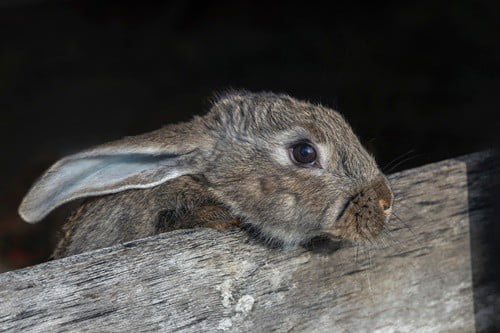Rabbits are unaccustomed to spending time in darkness. Wild rabbits wake early in the morning, and return underground before dark. Your pet rabbit will have similar hours to a human schedule.
Rabbits are not nocturnal, so their eyes cannot see in the dark. Rabbits do not have a tapetum lucidum, which helps some animals to see in the dark. In extreme darkness, rabbits rely on their other senses. A rabbit will hear and smell what she cannot see.
This means that darkness can be frightening for a rabbit. You must ensure that your pet feels safe and secure at night. Rabbits can literally be frightened to death.
How Do Rabbit’s Eyes Work?
A rabbit’s eyes are located on the side of her head. This creates a 360-degree field of vision. A rabbit’s only blind spot is anything directly below her nose.
This wide field of vision is a survival mechanism for rabbits. As a prey species, they need to be constantly vigilant. It’s almost impossible for a predator to sneak up on a rabbit. The threat will be spotted from any angle.
Rabbit eyes are made up of cones and rods. Cones are designed to determine colors. Rods help us see in different levels of light. The University of Miami elaborates on this further as it relates to rabbit anatomy.
Humans have three cones in our eyes. These enable us to interpret the three primary colors – red, blue, and yellow. Rabbits have only two cones. Your pet can only see in blue and green. This means that rabbits are partially colorblind.
The rods in a rabbit’s eyes also differ to those of a human. Rabbits have more rods than cones. These rods make up for a shortfall in light and enable a rabbit to see. This means that a rabbit’s vision is at its sharpest in dim light. As rabbits are most active at dawn and dusk, this makes sense.
How Far Can Rabbits See?
Rabbits are far-sighted. Like so much lagomorph anatomy, this aids survival. Rabbits need to be able to see at a great distance to spot potential threats.
This far-sightedness serves wild rabbits well. While grazing in a field, a wild rabbit can see a coyote in the distance. This allows the rabbit time to thump her foot and run. She has warned any underground friends and sought safety.
A domesticated rabbit will not necessarily need this long-distance vision. The walls of your home, or a fence in the yard, will enclose her. This keeps her safe from potential predators.
This means that your rabbit may seem skittish for no reason. She could see an airplane while playing in the yard, for example. This airplane may be too far away for you to see. For your rabbit, it’s right on top of her.
Because she is far-sighted, your rabbit will lack depth perception. She may be particularly clumsy at close range. Your pet may trip over her food bowl, or knocks things over. Her eyes are not designed for close encounters.
Your rabbit’s vision will also be comparatively blurry up-close. This is because of the rabbit’s fovea, found in the retina. In humans, the fovea curves inward. In rabbits, it doesn’t. This is why rabbit eyes sometimes bulge.
This explains why your pet may not always recognize you at first. If you are carrying something unwieldy, for example, you will look different. A rabbit’s eyes cannot decipher and differentiate between complex lines and shapes.
Your rabbit also combines her vision with her senses of smell and hearing. If you are wearing a new perfume, she may be alarmed. Speak to your pet to announce your presence.
How Well Can Rabbits See in the Dark?
Rabbits have night vision more comparable to a human than most mammals. Pure darkness will blind a rabbit, just like it does us. This is because wild rabbits do not need to see in the dark.
A rabbit’s eye does not contain a tapetum lucidum. This is a layer of tissue that sits behind the retina and reflects light. The tapetum lucidum allows nocturnal animals to hunt in darkness.
Rabbits are crepuscular. This means they are most active at dawn and dusk. These times are when wild rabbits emerge to eat and exercise. They’ll then retreat underground while potential predators are awake.
Due to this, rabbit eyesight in engineered to see best in dim light. When the sun starts to set and we need to squint, a rabbit sees perfectly. Soft, shadowy lighting is the perfect environment for a rabbit.
Due to the lack of a tapetum lucidum though, a rabbit is blind in the darkness. Your pet cannot see her paw in front of her face with no light at all. Never assume that a rabbit can make her way around in pure darkness.
This means that nighttime can be frightening for a rabbit. She will smell and hear everything around her, but not see it. As a prey species, this can cause stress and anxiety.
If your rabbit lives indoors, she will likely be fine. If you allow your pet to run free at night, she’ll be safe. Rabbits memorize the location of everything in the home. Just don’t leave anything dangerous lying around.
An outdoor hutch is a different story. Your rabbit will feel exposed. Do everything you can to make your pet feel secure. Healthy rabbits can suffer from cardiac arrest in periods of high anxiety.
How Can I Make My Rabbit Comfortable in the Dark?
A rabbit that is afraid of the dark can be a troublesome pet. Your rabbit will not want to return to her hutch at night. She will hide from you, and potentially become destructive in her anxiety. This must be overcome.
You have two options in this regard. The first is to keep your rabbit indoors at night. Some experts recommend this as it’s safer. There will challenges to this arrangement, though. You’ll still need to turn out the lights at night.
The second option is to help your pet feel safe in the dark. Rabbits need to feel secure in order to relax. Numerous steps will make up for a rabbit’s lack of night vision:
- Company. Rabbits always appreciate the company, especially when it’s dark. This is why wild rabbits live in groups. There is safety in numbers. If you can, keep rabbits in pairs. They’ll comfort each other at night.
- Provide Entertainment. Ensure your rabbit has fresh hay and interesting toys. Your pet will not be ready to go straight to sleep. Take her mind off the darkness with amusement.
- A Perspex Hutch Cover. Rabbits are aware as to how frail wire can be. Some rabbits chew through their own hutch foil. Predators will make short work of it. A Perspex cover is secure, and blocks outside stimuli.
- Soundproof the Hutch. If you can, insulate your rabbit’s hutch to make it soundproof. Coupled with a Perspex cover, this will block the sounds of nature. Your rabbit will not hear owls or foxes outside.
- Cover the Hutch. An alternative could be to cover the hutch at night. Use a tarpaulin, or even an old towel. Just remember, your rabbit will still smell and hear through this. She’ll be safer, but may not feel it.
- A Separate Bedroom Area. Create a separate area for your rabbit at night. An upturned cardboard box will do. This will make your rabbit feel like she has a protective barrier. She’ll be more comfortable this way.
- Create a Burrowing Space. This will appeal to rabbits, especially if it’s in a separate area. The ability to burrow appeals to wild instincts. Your pet will feel like she’s safely underground if she burrows under hay.
You will notice that we have not mentioned the addition of a light. This is not advisable, for several reasons.

Should I Give My Rabbit a Night Light?
Leaving a light on for your rabbit sounds like the easiest solution to her night vision problem. If you turn the light on low, she’ll still be able to see. She’ll feel safe, and will not encounter any accidents. But there are a number of problems with this:
- Rabbits cannot spend their entire lives bathed in light. Bright light hurts your pet’s eyes. Also, too much light causes stress. Your pet may gain weight, and struggle to eliminate.
- Rabbits need a contrast of light and dark to moderate their body clock. This is how a pet knows when to shed fur. If you plan to breed your rabbit, her reproductive cycle will also be affected.
- If a rabbit sees light, she’ll assume that it’s time to be active. This means that your rabbit will likely reject being in her hutch. She’ll make noise and try to escape, expecting a playtime.
- If you attach a night light to an outdoor hutch, you’ll need an external power source. Your rabbit may also chew through the wire when unsupervised at night. Rabbits get bored easily and make their own fun.
- If you leave the lights on in your home, your own sleep will be disturbed. Your rabbit will run around, potentially making noise. You’ll also end up with some expensive power bills.
- If lights are always on, your rabbit will fall out of step with her wake-sleep cycle. This can be problematic. Rabbits love routine. Your pet will be anxious and irritable without a schedule.
If your rabbit lives outside, you could try leaving a dim light in distance. A lantern, for example. Coupled with her sharp long-distance vision, this will offer your rabbit some measure of comfort.
If the light is dim, it should not be too problematic for you. It could attract other animals, though. Moths are an obvious annoyance. You may also attract foxes and neighborhood cats. You’re actually creating reasons for your pet to be afraid.
Alternatively, consider a motion-sensitive light. This will be activated if something moves. Be warned – these lights are sensitive. You’ll run up an expensive energy bill, often for no reason. The light may also spook your pet every time it comes on.
It’s better to rely upon training your rabbit to accept the darkness. This may take time and patience. It’s a necessary element of the human-rabbit dynamic, though.
Rabbits have a complicated relationship with light. Too much constant light is just as stressful as pitch blackness. You need to manage your rabbit’s needs carefully in this respect.
Remember that your pet cannot see in pure darkness. Do not expect her to negotiate obstacles at night. If she roams free, she needs a clear path. If she is in her hutch, she must feel safe and secure.

